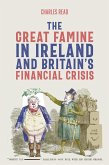Rich in archival detail and offering a ground-breaking analysis, this book presents a radically new interpretation of British politics and policy failings during the Great Famine.
The Irish famine of the 1840s is the biggest humanitarian crisis in the United Kingdom's history. Within six years of the arrival of the potato blight in Ireland in 1845, more than a quarter of its residents had unexpectedly died or emigrated. Its population has not yet fully recovered since.
Historians have struggled to explain why the British government decided to shut down its centrally organised relief efforts in 1847, long before the famine ended. Some have blamed the laissez-faire attitudes of the time for an inadequate response by the British government; others have alleged purposeful neglect and genocide. In contrast, The Great Famine in Ireland and Britain's Financial Crisis uncovers a hidden narrative of the crisis, which links policy failure in Ireland to financial and political instability in Great Britain. More important than a laissez-faire ideology in hindering relief efforts for Ireland were the British government's lack of a Parliamentary majority from 1846, the financial crises of 1847, and a battle of ideas over monetary policy between proponents and opponents of financial orthodoxy. The high death toll in Ireland resulted from the British government's plans for intervention going awry, rather than being prematurely cancelled because of laissez-faire.
This book is essential reading for scholars, students and anyone interested in Anglo-Irish relations, the history of financial crises and famines, and why humanitarian-relief efforts can go wrong even with good intentions.
The Irish famine of the 1840s is the biggest humanitarian crisis in the United Kingdom's history. Within six years of the arrival of the potato blight in Ireland in 1845, more than a quarter of its residents had unexpectedly died or emigrated. Its population has not yet fully recovered since.
Historians have struggled to explain why the British government decided to shut down its centrally organised relief efforts in 1847, long before the famine ended. Some have blamed the laissez-faire attitudes of the time for an inadequate response by the British government; others have alleged purposeful neglect and genocide. In contrast, The Great Famine in Ireland and Britain's Financial Crisis uncovers a hidden narrative of the crisis, which links policy failure in Ireland to financial and political instability in Great Britain. More important than a laissez-faire ideology in hindering relief efforts for Ireland were the British government's lack of a Parliamentary majority from 1846, the financial crises of 1847, and a battle of ideas over monetary policy between proponents and opponents of financial orthodoxy. The high death toll in Ireland resulted from the British government's plans for intervention going awry, rather than being prematurely cancelled because of laissez-faire.
This book is essential reading for scholars, students and anyone interested in Anglo-Irish relations, the history of financial crises and famines, and why humanitarian-relief efforts can go wrong even with good intentions.
Dieser Download kann aus rechtlichen Gründen nur mit Rechnungsadresse in A, D ausgeliefert werden.









